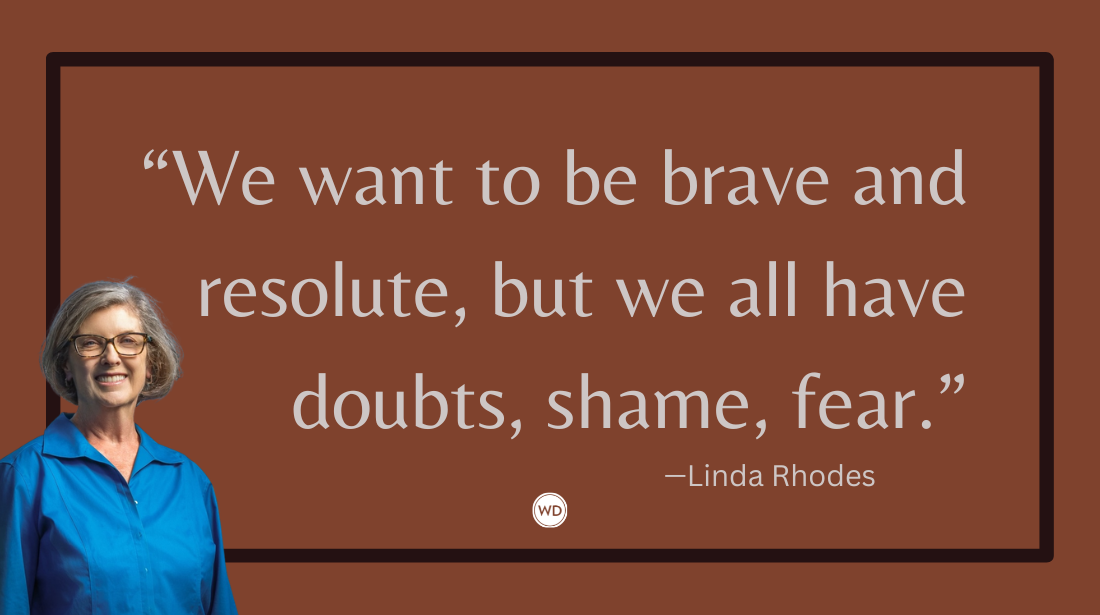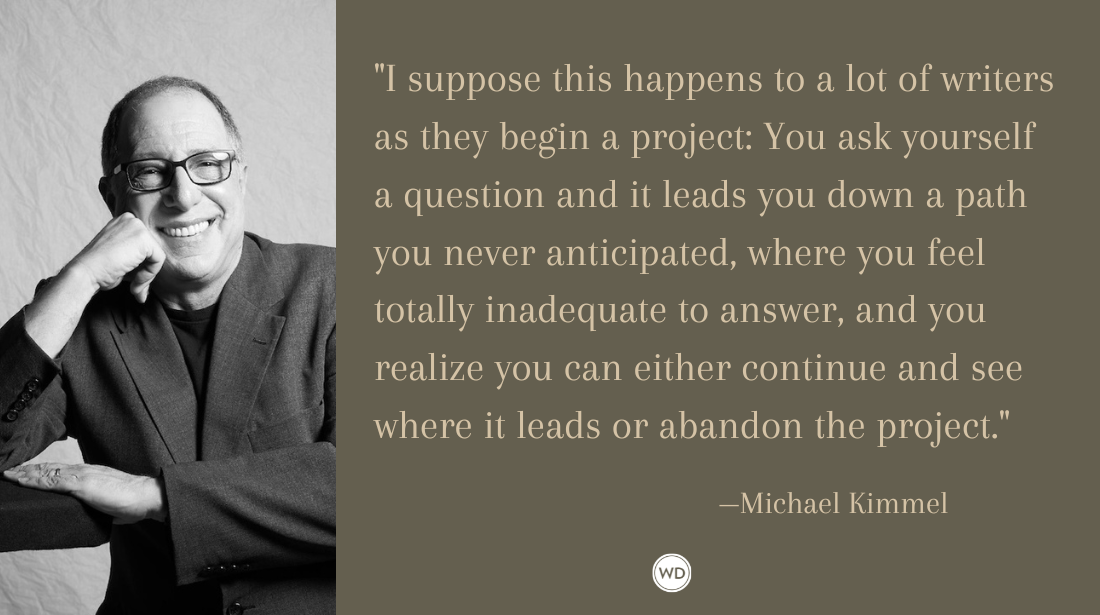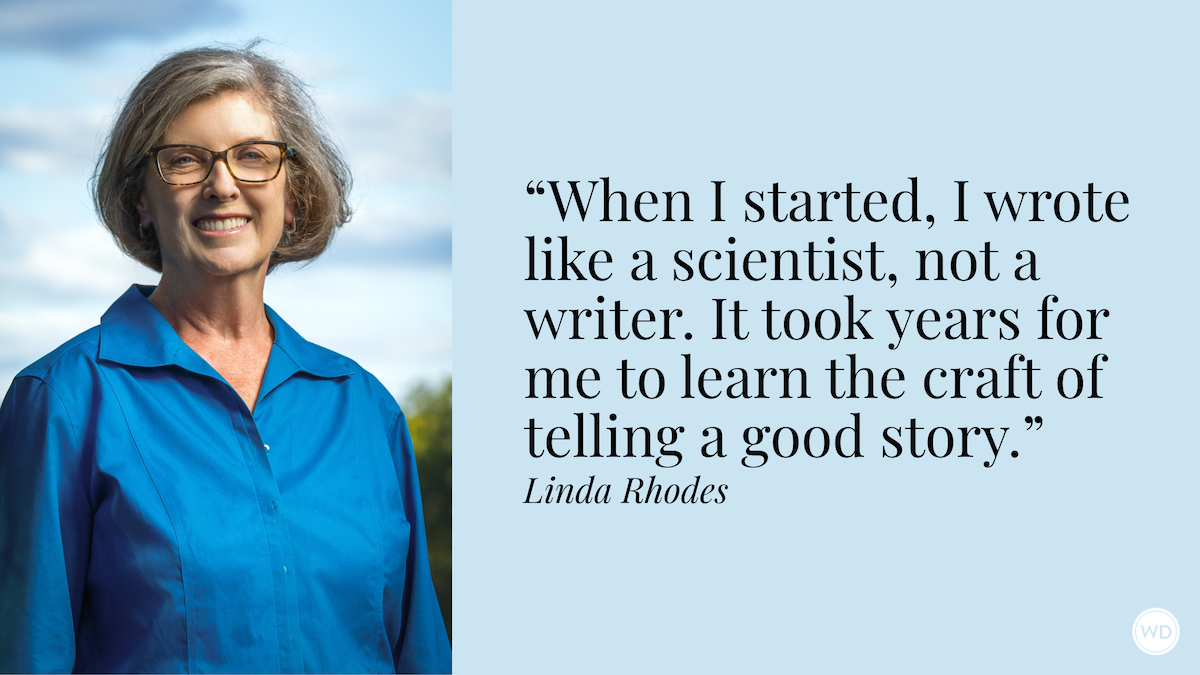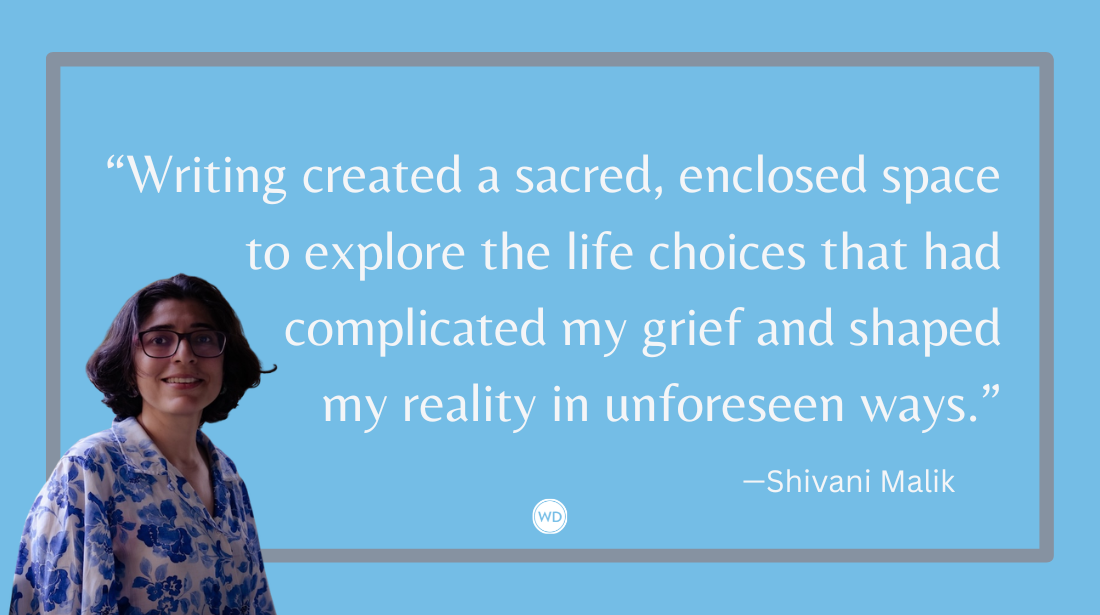How to Approach Friends and Family About Your Memoir
No one can decide whether showing your memoir to loved ones before it goes to press is the right choice for you. However, if you’re planning to approach your friends and family about it, let memoirist Ronit Plank give you 3 tips for doing so.
I recently interviewed an author for my podcast who told me she would get me a copy of her new memoir from the box her publisher sent and joked that I was going to get to read it before even her parents had. Thrilled to have a galley, I thanked her and got off the interview wondering what it would be like to release a memoir without having the people who it concerned see it first.
My memoir is all about my family: how my parents left—first my father who moved across the country, then my mother who went to India to follow the guru Bhagwan Shree Rajneesh, what happened when my mother returned but then left to follow Bhagwan again, and how she and I ultimately reconciled. I’d thought about not showing my parents and sister the manuscript, but, ultimately, I knew I would follow Mary Karr’s advice in her book The Art of Memoir to, “Notify subjects way in advance, detailing parts that might make them wince.”
Not that I was looking forward to having them read it—I was nervous about revealing the truth of my experience growing up, which is funny since I was going to publish several hundred pages about it. And I saw no reason to email them my manuscript if it was never going to see the light of day, so I waited as long as I possibly could, until the memoir was pretty close to done and I had a publisher, and only then did I push send. I wanted to prepare them for my public excavation of our history, let them voice their apprehensions, and most importantly, make sure that they wouldn’t disown me after it went to press.
That doesn’t mean offering friends and loved ones an early look at your memoir is right for everyone. Speak to a bunch of memoirists, and you’ll get a bunch of opinions. Pam Mandel, who wrote The Same River Twice, a memoir about domestic violence, had no interest in sharing her book with family before publication because she says, “I wasn’t making a documentary. I wasn’t inviting people to tell me their version of what happened at the time.” She also felt strongly about preventing any outside influence from changing the way she told her story. Kate Walter, who wrote the memoir Looking for a Kiss: A Chronicle of Downtown Heartbreak and Healing about the breakup of her long-term relationship, felt there was “no reason” to show her ex her book. “She cut me off after we broke up,” Walter says, and “she knew I was writing a memoir.” Stephanie Weaver, author of the memoir-in-progress What My Mother Fed Me about growing up with abuse and family denial, has also decided against offering relatives a preview of her memoir to avoid potentially upsetting people. And, she notes, if she had “people weighing in on whether I had the right to tell my story,” she might not ever finish her book.
IndieBound | Bookshop | Amazon
[WD uses affiliate links.]
Holding onto the conviction that we have a right to tell our story is a powerful factor in the decision to share or not to share a memoir before it officially enters the world, and each writer must gauge what feels right to them. For some memoirists like Keema Waterfield, author of the new memoir Inside Passage, and for me, allowing the people we’ve written about to preview our books feels the most appropriate even with the myriad complications doing so can bring. Waterfield’s manuscript about her nomadic childhood, poverty, and dream of a permanent home caused her mother to react “with a great deal of pain,” in part because “she hadn’t volunteered to reveal so much of her life story. Writing about someone else’s trauma,” Waterfield learned, can be “particularly tricky.” But she’s never regretted sharing it with her mother “because it clarified I value our relationship more than anything, and I carried that over subsequent revisions.”
No one can decide whether showing your memoir to loved ones before it goes to press is the right choice for you. Like the writing process, it’s deeply personal. If you do you send a copy to your loved ones, keep the following in mind.
3 Ways to Approach Friends and Family About Your Memoir
1. It’s jarring to read about yourself as a character in someone else’s story
Most of us see ourselves as the “good guy” in the script about our lives: a person trying their best. When we become a character in another person’s story, that feeling dissolves and so does our sense of control; we become a background player. We don’t get the last say and the reader doesn’t necessarily hear our side. Take a moment and imagine being in your loved one’s shoes. Reading about themselves might be disconcerting; they may feel threatened or deeply uncomfortable. There isn’t much we can do about how others react to what we’ve written, but we can be sure we’ve written with integrity.
It’s not uncommon in the memoir-writing process to get caught up and focused on the ill deeds of loved ones, especially if they’re still behaving badly, manipulating, or abusing. But every character in a memoir who gets significant time on the page deserves to be more than a sketch. Have you delivered the most clear-headed version of events you can recall? Have you illuminated who the people you write about are beyond who they are to you?
In her book on craft, The Situation and the Story, Vivian Gornick instructs memoirists to capture complexity in the people they write about, even if those people are the source of great conflict or pain for the memoirist. “For the drama to deepen,” she asserts, “We must see the loneliness of the monster and the cunning of the innocent.” Writing a memoir is not meant to be an exercise in passing judgment. It is of the utmost importance for memoirists to portray the people they write about as fully dimensional as possible in scene and dialogue to show the memoirist’s mind hard at work trying to puzzle their behavior out. As Mary Karr recommends in The Art of Memoir, memoirists should “not speculate on other people’s motives.”
It takes compassion and strength to see the ways in which one who has caused pain may be weak or compromised herself. If you’ve done your job, you have painted a rich picture of those in your story who had the biggest impact on you so that they are fully-fleshed-out people and not merely placeholders or one-dimensional characters. Doing so not only assuages any doubts you might have about your portrayal of them but offers readers the opportunity to experience your story closer to the way you did when you were actually living it.
2. Don’t get into arguments about facts
Memory is faulty and each of us recalls things differently. When I showed my pages to my sister, she reminded me of two significant events I’d completely left out. Her perspective allowed me to incorporate scenes that I think enhanced my story and helped shape the arc of my memoir. Another family member disagreed with some of what I included, and we went back and forth at a café table, quite heated at times, both certain we were right.
The exchange left me frustrated and angry. It bothered me that I needed to go to bat for myself twice: first by writing the manuscript, second by defending what I know happened. I better understood why memoirists Mandel, Walter, and Weaver opted not to show their manuscript to loved ones. If I had to do it again, I would listen to my frustrated relative without interrupting. I would acknowledge their perspective without snapping back. Even if I wanted to dig my heels in, I would try to take in what they were saying, and then I would make every effort to entertain their concerns knowing the decision is up to me.
3. Be clear about what you expect from your loved ones
Before you reveal your work-in-progress, check in with yourself about why you are showing loved ones your pages. Do you want their blessing? Their admiration? You may not get either of these from the people who mean the most to you. In fact, you may not get any feedback at all that makes you feel good about your project but that’s what your writing community or workshop group is for. Your memoir is so very personal and that’s what makes it charged and complicated for loved ones to read. The best reason to offer an early look might be so that you can rest easy knowing that you paid them the respect you’d hope for if the situation were reversed.
Remember too that it’s all right to entertain their hurt. Your ability to understand how hard reading your memoir is for them doesn’t negate what you’ve written about or your decision to put it into the world. It’s a both-and. You understand it might be hard for them and you’re still putting it into the world. You, like everyone, have a right to tell your story. And if a loved one balks, you can let them know there’s nothing stopping them from writing their own memoir which you hope they will share with you before it goes to press.
Let empathy be your guide. Just as a memoir should seek to understand the complexity of relationships, the choices we made, and how we changed, sharing our work with loved ones can come from both a generosity of spirit and a certainty that each of our stories matter.
Ronit Plank is a writer, teacher, and editor whose writing has earned Pushcart Prize, Best of the Net, and Best Microfiction nominations and has appeared in The Atlantic, The New York Times, The Washington Post, Writer’s Digest, Hippocampus and elsewhere. Her memoir WHEN SHE COMES BACK about the loss of her mother to the guru Bhagwan Shree Rajneesh and their eventual reconciliation was named Finalist in the 2021 Housatonic Awards and was one of Book Riot’s 2021 Best New True Crime Books, and her short story collection HOME IS A MADE-UP PLACE won Hidden River Arts’ 2020 Eludia Award. She earned an MFA in Nonfiction Writing at Pacific University, is Creative Nonfiction Editor at The Citron Review, and hosts and produces the podcast Let’s Talk Memoir featuring interviews with memoirists and writing teachers about memoir craft and the writing life. For more about Ronit and a complete list of work visit: https://ronitplank.com/.









